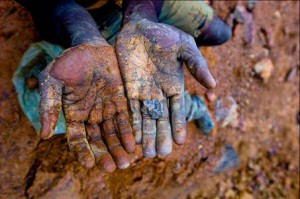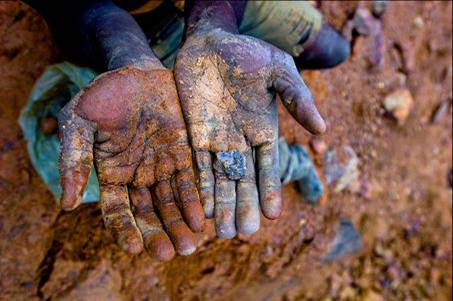
For Americans, anything a person could possibly want is more easily attainable than ever. Electronics are in an electronic store, thousands of food items are in grocery stores and all different types of clothing and sizes are in clothing stores, and they are all conveniently located in a shopping center close to several cookie-cutter neighborhoods.
Before taking CML–Cultural Media Literacy–at Leesville, I never thought about where my food, clothing, and possessions came from. All I knew was that if I wanted something, I knew where to buy it.
An assignment in CML class was to work with a partner and produce a spoof ad of a company or product. Zoe Simpkins, fellow senior, and I decided it would be a good idea to spoof the iPhone because so many people at Leesville have one.
While doing our research, I discovered an article that shocked and devastated me. I was ignorant of the fact that children are being treated as slaves in the Congo and were forced to work in mines to get the metals necessary for producing the iPhone.
“I feel bad for buying the phone because I feel like I’m contributing to the problem. I think that consumers should be able to know where their products come from without having to do excessive research. Companies should be required to tell their customers,” said Jeffery Burruss, senior.
After reading Sesete’s article, I felt inspired to see how difficult it would be to verify this information on my own. Surprisingly, it wasn’t difficult at all. I used Google, and instantly page after page of blogs, articles and reliable resources came up.
So why doesn’t the average iPhone user know this information? Technically, if someone was concerned about where Apple products come from, they can find the information on the Internet if they search hard enough. However, I think all companies should be required to post their product information in their stores and in their products.
“It is the consumer’s responsibility to research where their products come from. Buyers beware [when it comes to the ethical sourcing of their products],” said Mr. Broer.
Now that I know this information, I feel very conflicted. I have the iPhone 4, and I use it everyday to communicate with family and friends. I could get a different phone, but what difference would that actually make in the grand scheme of things?
My generation has been taught to treat others with respect. Fifty years ago, bullying was more acceptable by social norms. Twenty years ago, people used the terms “retard,” “cripple,” and other derogatory terms more loosely than they do now. We’ve all grown up learning the “golden rule”: do unto others as you want them to do unto you.
Even if we aren’t religious, we as a generation believe in the golden rule. Learning information about the corrupt companies we buy products from forces us to struggle with our paradigm. We are all so used to getting what we want when we want, and now perhaps we have a reason to pause.
With all of that said, what can high schoolers at Leesville do about this atrocity? The woman who wrote the article hyperlinked above suggested that Apple be the first company to make a conflict-free phone. Meaning, Apple would use mines in the Congo that promote stability and economic development and don’t use slave labor or fund mass atrocities.
For now, all we can do is petition, educate others, speak our minds, and wait. We can stop buying apple products and upgrading to latest, newest, fastest piece of metal created by the small hands of child slaves.
Apple, checkmate.

Leave a Reply